Academic Pathology Executives Section (APEX) Fellowship Program
Purpose
The Society of ’67 Academic Pathology Executives Section (APEX) Fellowship Program provides an opportunity for emerging pathology executives (Affiliate APEX Members) to attend the APEX Program at the Association for Academic Pathology (AAPath) Annual Meeting with funding that covers the APEX meeting registration. The NEW application period opens in November and closes in December annually.
History: In 2019, senior APEX (formerly PDAS) members recognized that pathology departments would be undergoing transitions in departmental executives/administrators due to an upcoming generational retirement of current APEX members. In identifying this need for emerging pathology department executives to remain an important force in academic pathology administration, an “Associate” member category in the APEX Section was established to include an avenue for non-lead department executives to gain insight and mentoring from the network of APEX members, especially via listserv discussions and by attending the APEX Program at the AAPath Annual Meeting. The APEX Fellowship Program was then initially conceptualized and supported as part of a Society of ’67 fundraising challenge by an anonymous donor in 2019. The launch of the program in 2021 was accelerated by a generous donation in 2020 from Physician Data Management (PDM), a Coronis Health Company.
Program Application Timeline:
The application period for the 2026 Society of '67 APEX Fellowship Program closed on 12/31/2025. Please contact the AAPath Awards Team at [email protected] for further assistance.
- Applications Open – November 2025
- Application Deadline – December 31, 2025
- Applicant Notification By – April 2026
The 2026 Society of '67 APEX Fellows will:
- receive an immersive experience on topics for managing the departmental missions of academic pathology practice, medical education, and research;
- learn about models and strategies in administrative operations for pathology and laboratory medicine stakeholders; and
- interact with our community of academic pathology administrators bringing a network of professional support and resources.
Requirements of APEX Fellows:
- attend the APEX Program at the AAPath 2026 Annual Meeting, July 19-22, 2026;
- participate in designated APEX Fellow activities, starting on Sunday, July 19, 2026;
- attend the Awards Lunch Program on Wednesday, July 22, 2026;
- be recognized as a Society of '67 APEX Fellow throughout the program (in person, print, and photos);
- provide a post-conference brief report of their experiences; and
- comply with the AAPath Code of Conduct throughout the meeting.
Eligibility: Affiliate APEX Members are eligible to apply. Refer to the APEX Operating Procedures for information about Affiliate membership to the APEX Section, as well as how to apply and join your departmental membership with the AAPath: www.academicpathology.org/join-today.
Marty Lawlor Designation: Martin (“Marty”) Lawlor was a highly respected administrator, leader, mentor, and friend within the APEX (formerly PDAS) community of the Association for Academic Pathology (AAPath). He dedicated over a decade in multiple administrative roles for the Department of Pathology and Laboratory Services at UCLA. In 2007, he became the Chief Department Administrator for the Department of Pathology at the University of Michigan, a position he held until his untimely passing in September 2021. Marty was instrumental in establishing the foundation for what is now the APEX Section of the AAPath.
In recognition of Marty’s steadfast commitment to mentorship and professional development, the APEX Council established in 2021 that one of the annual Society of ’67 APEX Fellowship Award recipients would be designated as the “Society of ’67 Marty Lawlor APEX Fellow.” The honoree is selected by the APEX Council based on qualities that Marty exemplified and fostered: leadership potential, credibility, inclusive leadership, accomplishments, and dedication to community service. Through this enduring recognition, Marty’s legacy of mentorship and his contributions to the advancement of academic pathology administration will continue to inspire and shape future generations of administrative leaders.
If you wish to be considered for this designation, please indicate as such in Question 8 on the online application. Please be sure to address in your responses and request your Letter of Recommendation writers to highlight those specific characteristics in their letter.
Letter of Recommendation Details: A joint Letter of Recommendation from the Department Chair and APEX member must be submitted no later than the December 31st deadline, either directly by the person writing your letter to our Awards email (awards@academicpathology.org), or if you are given a copy, uploaded into the online application form. Please be sure to have the Chair and APEX member include in the letter:
- Why you are deserving of this APEX Fellow Award, including leadership potential, credibility, demonstration of inclusive leadership, technical accomplishments, and community service;
- Permission to travel and attend the AAPath Annual Meeting from Sunday, July 19 through Wednesday, July 22, 2026; and
- Commitment to support travel expenses (air, ground, non-conference meals, etc.).The Society of '67 award will only provide the APEX meeting registration.
Application Instructions
The application period for the 2026 Society of '67 APEX Fellowship Program closed on 12/31/2025. Please contact the AAPath Awards Team at [email protected] for further assistance.
QUESTIONS? Contact the Awards team at awards@academicpathology.org.
Congratulations to the Society of '67 2025 APEX Fellow!
Jessie Feudale, MA, University of North Carolina-Chapel Hill School of Medicine
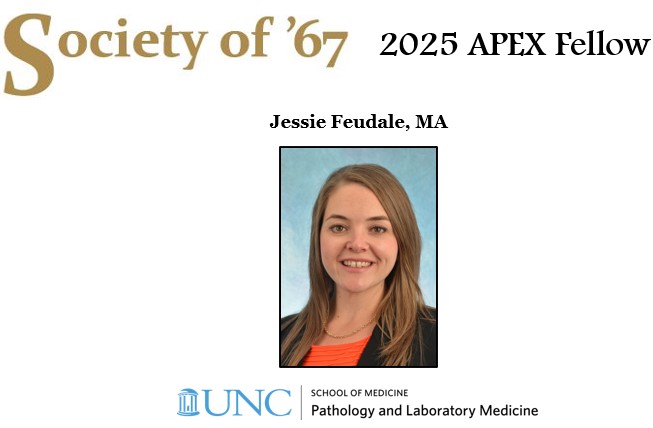
Past Society of '67 APEX Fellows
Kristin Schieble, Medical College of Wisconsin - 2024 Marty Lawlor APEX Fellow
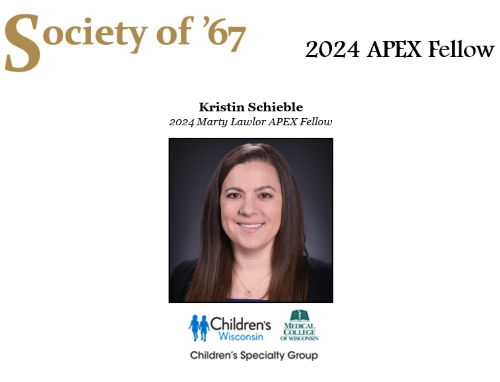
2023 APEX (formerly PDAS) Fellow
Latisha Rider, Boston Children's Hospital - 2023 Marty Lawlor APEX (PDAS) Fellow
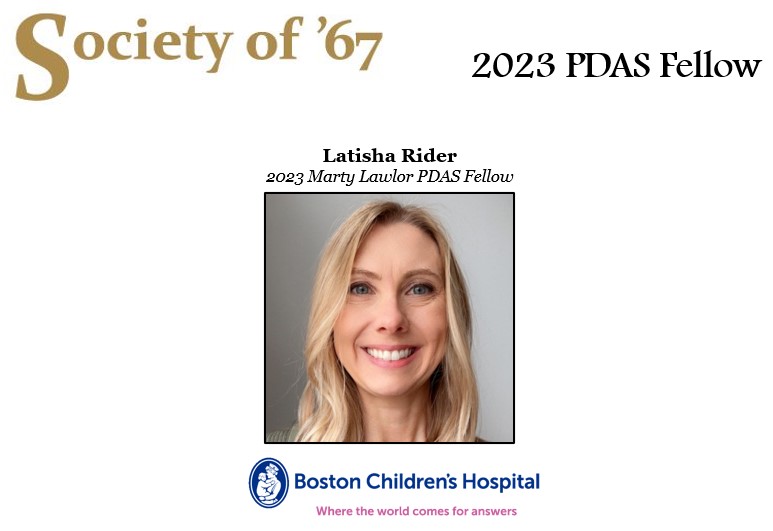
2022 PDAS Fellow
Yasmeen Majoka, Columbia University Irving Medical - 2022 Marty Lawlor PDAS Fellow
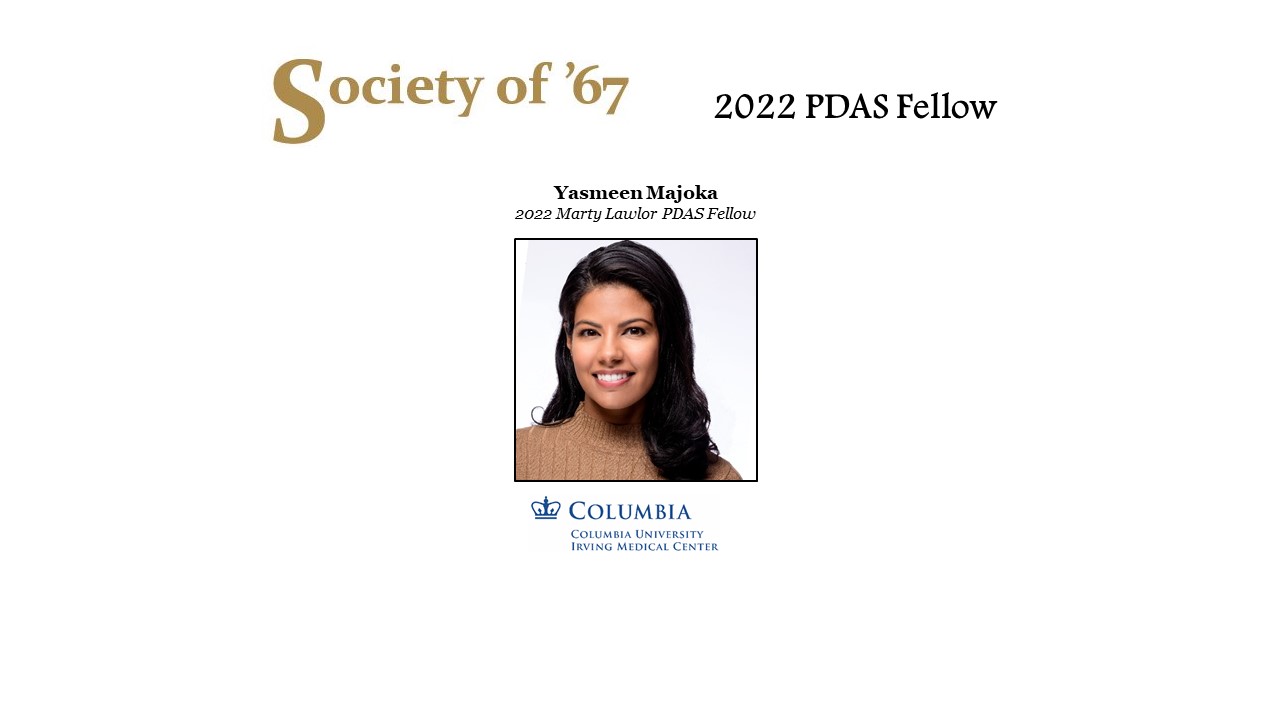
2021 PDAS Fellows
Danielle Burns, University of North Carolina, Chapel Hill
Jeannette Le, Massachusetts General Hospital
Burt Martinez, University of New Mexico
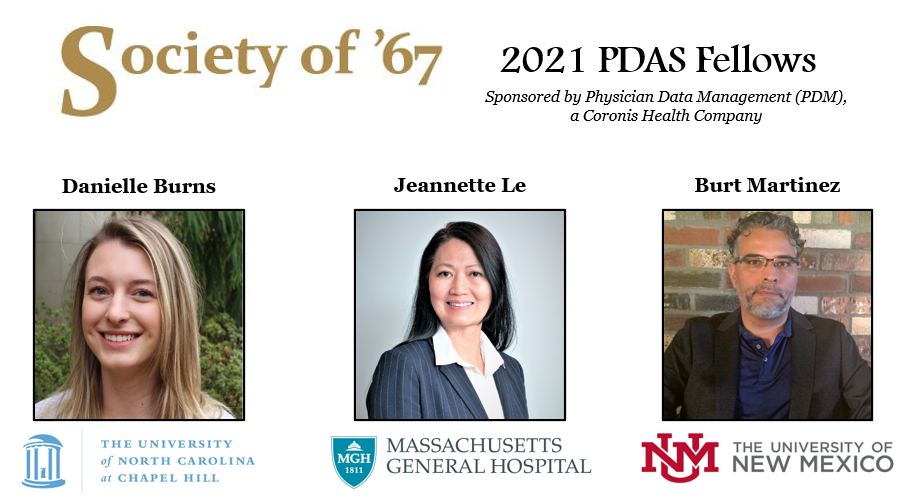
|





